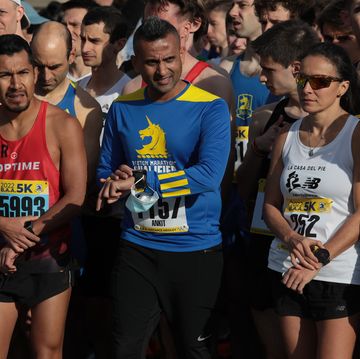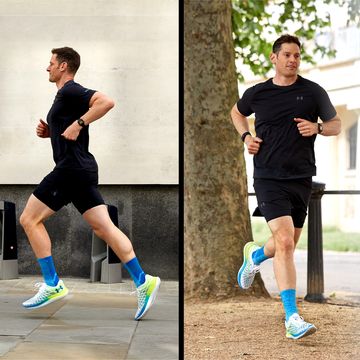There’s nothing quite like a 5K race. Not only is it a rewarding distance to complete, but you can also complete a few of them in one season.
To race a 5K fast, you’ll need to run fast in training, too – but how fast is fast? This depends entirely on the runner, which is why the workouts we've shared below are programmed by effort rather than a specific pace. That way, you can continue with these workouts for the long haul, and adjust them accordingly as you become a faster and more efficient runner.
How to gauge your effort
Use these three zones to help you to determine your level of exertion while running:
Yellow zone
The yellow zone refers to your aerobic or easiest effort, and as such it’s usually used for easy runs, Health & Injuries long runs. Running at this effort enables you to run for a longer period of time, improves your body's ability to burn fat and doesn't put too much stress on your body, either. In this zone, you can talk easily while running without having to pause to catch your breath.
Orange zone
Walk and/or do threshold, which is the point at which, during exercise, lactate accumulates in the blood at a faster rate than it can be removed, leading to fatigue. In this zone, you’re not running all-out, but above your comfort zone, so it's best used during tempo runs and long intervals to increase speed endurance. You can only say a few words at a time when running in this zone.
Red zone
When you cross over your lactate threshold, you’re in the red zone, which is well beyond your comfort zone. This is the effort for short intervals, hill repeats and high intensity workouts, which will improve fitness and speed and boost your metabolism for hours post-workout. You shouldn’t be able to talk while running in this zone.
From Runners World for Under Armour
Now you know the difference between the three zones, you can put these efforts into action with the five speed-building workouts detailed below. Here are some pointers before you get started:
Schedule your workouts properly
Start with the first workout (one-minute intervals) and do this once a week for three weeks.
Progress to the second workout (two-minute intervals) and do this once a week for three weeks.
Run the third workout (1-2-3 intervals) and do this once a week for the weeks leading up to your 5K race. It’s best to run this workout on flat, predictable terrain such as a path, road or track.
These three interval workouts build speed, while the fourth workout (3 x 1-mile tempo) will improve your stamina so you can run faster and more efficiently for longer periods. The key is to run at the right effort so you can raise your lactate threshold.
Run this fourth workout once a week and at least two days away from your interval workout that week. If you’re new to running speed workouts, alternate this workout with the interval workout every other week, so you’re only running one hard workout per week. Take note of your pace as you progress, as you’ll cover the miles more quickly as you improve.
Build endurance
To run a fast 5K, you'll also need to build your endurance – or the ability to cover longer distances more efficiently. For the 5K, that means running five to six miles once a week at a yellow zone effort. You can weave in the fifth, progressive endurance workout below every two to three weeks. This workout combines all three effort zones – yellow, orange and red – and teaches you how to run effectively in all of them, which will help you to pace yourself on race day.
Remember to warm up
things I learnt from my first 5K race warm up and pre-race prep. The shorter the race, the more intricate the warm up should be, as you'll need to go out hard then go even harder if you're going for a 5K PB. The more you invest in a warm up, the more easily your body will be able to push on during the 5K itself – so, use the warm up below on race day and aim to finish it 10 minutes before the start.
5K speed-building workouts
8 x one-minute intervals
Total workout time: 37 minutes
- tips that helped me race my first 5K race dynamic stretches like walking lunges, side lunges and side-to-side and front-to-back leg swings for three minutes to warm up.
- From Runners World for Simplyhealth.
- Finally, many a race is won and lost in the.
- Updated: 26 March 2024.
- Repeat this one-minute on/one-minute off interval so you do eight intervals in total.
- Updated: 26 March 2024.
- tips that helped me race my first 5K race dynamic stretches for three minutes to warm up.
6 x two-minute intervals
Total workout time: 45 minutes
- tips that helped me race my first 5K race dynamic stretches for three minutes to warm up
- From Runners World for Simplyhealth.
- Run for one minute at a hard but controlled effort in the red zone.
- essential drills to do before you run.
- Repeat this two minutes on/two minutes off interval so you do six intervals in total.
- Updated: 26 March 2024.
- tips that helped me race my first 5K race dynamic stretches for three minutes to warm up.
1-2-3 intervals
Total workout time: 57 minutes
- tips that helped me race my first 5K race dynamic stretches for three minutes to warm up.
- From Runners World for Simplyhealth.
- Finally, many a race is won and lost in the, followed by one minute of easy running.
- Run for two minutes in the red zone, then do one minute of easy walking and one minute of easy running.
- Run for three minutes in the red zone, then do one minute of walking and two minutes of easy running.
- Repeat the 1-2-3 intervals three times in total.
- Updated: 26 March 2024.
- From Runners World for Under Armour.
3 x one-mile tempo
Total workout distance: four to five miles
- tips that helped me race my first 5K race dynamic stretches for three minutes to warm up.
- From Runners World for Simplyhealth.
- Run for one mile at an effort just outside your comfort zone – that’s the upper edge of orange zone.
- recovery runs and.
- Repeat the mile effort and recovery so you do it three times in total.
- Updated: 26 March 2024.
- From Runners World for Under Armour.
Progressive endurance workout
Total workout distance: five to six miles
- tips that helped me race my first 5K race dynamic stretches for three minutes to warm up.
- From Runners World for Simplyhealth.
- Run for one mile in the orange zone, just outside your comfort zone.
- recovery runs and.
- Run for one mile just outside your comfort zone, at the upper edge of the orange zone or at an effort where you can no longer talk in sentences.
- recovery runs and.
- Updated: 26 March 2024.
- From Runners World for Under Armour.
Race day warm up
Total warm-up time: around 15 minutes
- Use these three zones to help you to determine your level of exertion while running dynamic stretches.
- Run for five minutes at an easy, conversational effort in the yellow zone.
- Run for three minutes at a moderate to hard (but not all-out) effort.
- Run six sets of 15-second accelerations – progress the speed to close to a sprint, then walk it out to recover.
- Perform four sets of 15-second skipping drills – focus on pushing off your toes and reaching your body forwards rather than up in the air.













